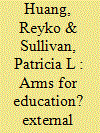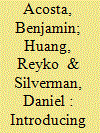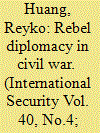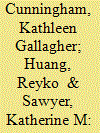|
|
|
Sort Order |
|
|
|
Items / Page
|
|
|
|
|
|
|
| Srl | Item |
| 1 |
ID:
180200


|
|
|
|
|
| Summary/Abstract |
How does foreign support for rebel groups affect rebel governance of civilians during armed conflict? Existing studies primarily examine the local and domestic politics of rebel rule, leaving the effects of foreign intervention on rebel governance underexplored. Focusing on rebel provision of social services, this study considers two competing arguments. The first suggests that foreign sponsorship reduces rebels’ need to rely on local civilians for resources and hence decreases rebels’ incentives to provide services. The second anticipates that by augmenting rebels’ resources and military capabilities, foreign support increases their capacity to provide welfare services. These competing logics suggest that different types of foreign support have divergent effects on rebel social service provision. The article tests this theory using cross-sectional time-series data on external support for rebel groups and rebel governance for the post-1945 period. It finds that rebel groups that receive external funding, weapons or training are significantly more likely to provide education and health services to civilians. In contrast, direct military intervention to assist insurgent forces has no effect on rebel service provision. This article is among the first to systematically study the impact of external support and third-party intervention on rebel social service provision during civil war and holds implications for civilian welfare in contested territories.
|
|
|
|
|
|
|
|
|
|
|
|
|
|
|
|
| 2 |
ID:
118180


|
|
|
|
|
| Publication |
2012.
|
| Summary/Abstract |
Why do some states emerging from civil war take significant strides toward democracy while others do not? The existing literature comes to contradictory and puzzling findings, many of which, we argue, are driven by methodological problems. We examine the determinants of democratization in the short, medium, and long term after civil wars ending between 1945 and 1999. Other than a short-term effect of negotiated settlements, we find little support for the prominent claim that the outcome of the war shapes the prospects for postwar democratization. Neither does peacekeeping foster democratization. Meanwhile, consistent with the more general democratization literature, we find that economic development aids democratization while oil wealth hinders it. In short, we find the determinants of democratization to be much the same for post-civil war societies as for other societies.
|
|
|
|
|
|
|
|
|
|
|
|
|
|
|
|
| 3 |
ID:
190845


|
|
|
|
|
| Summary/Abstract |
Existing literature on civil wars relies predominantly on state- and organization-level variables to understand conflict dynamics and outcomes. In this article, we propose that rebel leaders’ personal backgrounds and experiences are also key to explaining the behavior of the organizations they lead. Just as scholars have long highlighted the importance of state leaders’ biographical characteristics in interstate war and diplomacy, we argue that the attributes of rebel leaders affect their organizations’ decisions and actions in civil war. To substantiate our claims, we introduce the Rebel Organization Leaders (ROLE) database, which contains a wide range of biographical information on all top rebel leaders in civil wars ongoing between 1980 and 2011. We first describe the contents of the database and present a number of novel descriptive findings about rebel leaders. To illustrate its utility, we then examine the influence of rebel leaders’ attributes on their organizations’ use of terrorism in civil war. Ultimately, our work encourages – and enables – a new research agenda that goes beyond rebel organizations and campaigns as units of analysis and brings individual leaders more fully into modern conflict and peace studies.
|
|
|
|
|
|
|
|
|
|
|
|
|
|
|
|
| 4 |
ID:
145230


|
|
|
|
|
| Summary/Abstract |
In the midst of civil war, rebel groups often expend significant resources opening offices in foreign capitals, meeting with heads of state, expanding their overseas networks, appealing to international organizations, and contacting foreign media. Existing scholarship has generally neglected international diplomacy as an aspect of violent rebellion, focusing instead on rebel efforts at domestic organization. A systematic documentation of rebel diplomacy in post–1950 civil wars using new quantitative and qualitative data shows that rebel diplomacy is commonplace and that many groups demonstrate as much concern for overseas political campaigns as they do for domestic and local mobilization. Diplomacy, furthermore, is not a weapon of the militarily weak, but a tactical choice for rebel groups seeking political capital within an international system that places formidable barriers to entry on nonstate entities. An original analysis of the diplomacy of the National Union for the Total Independence of Angola in the Angolan civil war using archival sources further demonstrates why rebels may become active diplomats in one phase of a conflict but eschew diplomacy in another. More broadly, the international relations of rebel groups promise to be an important new research agenda in understanding violent politics.
|
|
|
|
|
|
|
|
|
|
|
|
|
|
|
|
| 5 |
ID:
177013


|
|
|
|
|
| Summary/Abstract |
Rebel actors engage in a number of behaviors beyond violent conflict, including social service provision, diplomacy, and establishing local governance. This article centers on an oft-overlooked aspect of rebel behavior and governance: rebel groups conducting popular elections in wartime. We argue that rebel elections are a means through which rebels can strengthen both local and international legitimacy, but that there are risks to employing elections (such as logistical failures or publicized disconnect from civilians). We hypothesize that rebels that are pursuing legitimacy (local and international) in other ways are likely to set up rebel elections and that rebel groups with greater organizational capacity are more likely to introduce elections because they are well placed to manage the risks elections entail. Using a global data set of rebel use of elections where local civilians vote to elect rebel representatives at various levels of organizational hierarchy, we find empirical support for these propositions.
|
|
|
|
|
|
|
|
|
|
|
|
|
|
|
|
|
|
|
|
|